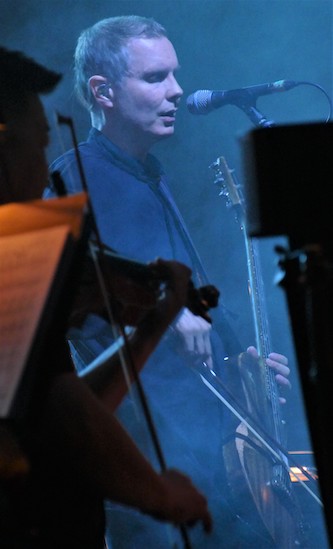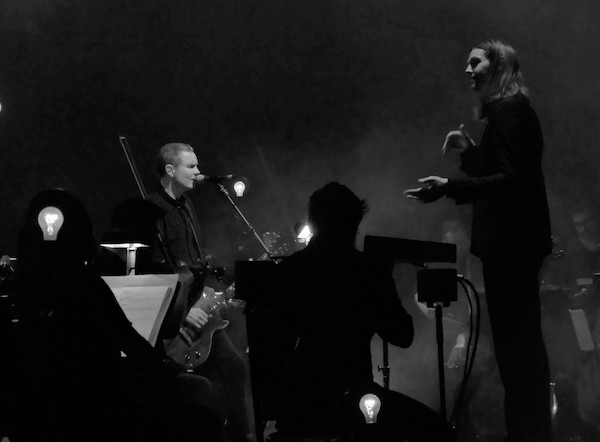Concert Review: Mood and Mystery — From the Symphonic Post-Rock Palette of Sigur Rós
By Paul Robicheau
Languid sameness dominated the Wang concert at times, though the acoustic strings and subtly submerged horns and percussion made the sonic scope of Sigur Rós’ music more delicate and human.

Jonsi of Sigur Rós with Wordless Music Orchestra at Boch Wang Theatre. Photo: Paul Robicheau
Most rock bands that perform with an orchestra simply dress up their standard uniform with a fancy cape that doesn’t exactly match. But the Icelandic group Sigur Rós was made to fit orchestral accompaniment, since its music exists to conjure atmosphere, mood, and mystery from a symphonic post-rock palette.
Thus, when Sigur Rós played Boston’s Boch Wang Theatre on Sunday, its three members were folded both visually and sonically within the ranks of New York’s 41-piece Wordless Music Orchestra as part of a joint eight-city North American tour.
The spotlight settled on frontman Jónsi, tucked behind conductor Robert Ames’ bandstand and flanked by his Sigur Rós mates, bassist Georg Holm and recently returning keyboardist Kjartan Sveinsson. Yet, within the wispy clouds of stage fog faintly colored by banks of lights and candle-like bulbs on poles, the black-attired musicians of Sigur Rós and the orchestra (including a second keyboardist) handled interchangeable roles like phantoms. And when Jónsi wielded his signature violin bow to electric guitar, it was somewhat lost amid the orchestra’s layers of strings.
The knock on Sigur Rós is that songs can sound the same, a situation not helped when Jónsi impressionistically sings in Hopelandic (or Valenska in Icelandic), an invented language that lacks syntax or meaning – in essence, ghostly gibberish. Languid sameness dominated the Wang concert at times, though the acoustic strings and subtly submerged horns and percussion made the sonic scope of Sigur Rós’ music more delicate and human. And even when he was singing gibberish, Jónsi’s high, arcing voice was gorgeously spectral and striking in the novel setting.
The first of two roughly 55-minute sets especially took time to build, as Jónsi alternated between guitar and piano. Four songs in, the orchestra’s percussion section made its presence known, first in cymbal swells for “8” (from Átta, Sigur Rós’ glorious first studio album in 10 years), then with mallet-driven drums behind the bass, keyboards, and bow-sawed guitar of “Von.” That title track of the group’s 1997 debut brought audible recognition from fans in the sold-out Wang.
More applause greeted the set’s climatic early piece “Starálfur,” which juxtaposed Holm’s acoustic guitar strums with bold, resonant strokes from the violin section, evoking George Martin’s grand string arrangements for the Beatles. “Dauðalogn” added a haunting synthetic chorus before Jónsi walked offstage to let the orchestra garner attention for the melancholy coda of “Varðeldur.”
The second set served more rounded highlights, opening with two songs from Sigur Rós’ 2002 breakthrough () – “Samskeyti” began with prominent cellos and double bass before its beautiful piano progression took over. Graced by Jónsi’s yearning vocals over bass chords, “Heysátan” hewed to the band’s core trio, while the new “Skel” began with slow strings and ended with Jónsi creating spookily bowed sonics on guitar. He returned to piano for the Eno-like ambience of “All Alright,” its rare English lyrics easy to miss amid his somber, extended vowels.

Sigur Rós with Wordless Music Orchestra at Boch Wang Theatre. Photo: Paul Robicheau
Again, dynamics picked up toward the end of the set with a pair of songs from 2005’s Takk… Vibes led to percussive swells capped by kettle drums and even an oompa rhythm in “Sé Lest,” the pole bulbs brightening to the buildup and then flickering to close. The crowd loudly greeted “Hoppipolla,” which managed an overt pop melody, boosted by brass over a percussive beat and a pensive final piano note before the orchestra closed the night with “Avalon” (not to be confused with the Roxy Music song).
The audience demanded a second curtain call, but there would be no encore – and there didn’t need to be one. Sigur Rós and the Wordless Music Orchestra had deftly made their symbiotic statement, especially to the delight of hardcore fans.
Paul Robicheau served more than 20 years as contributing editor for music at the Improper Bostonian in addition to writing and photography for the Boston Globe, Rolling Stone, and many other publications. He was also the founding arts editor of Boston Metro.
Tagged: Átta, Jonsi, Kjartan Sveinsson, Robert Ames, Sé Lest, Sigur Rós, Takk…
